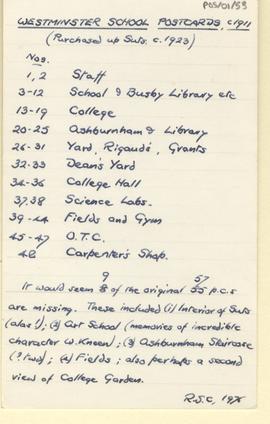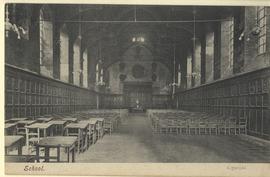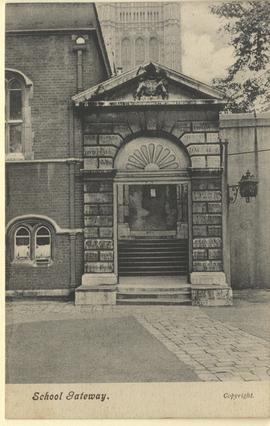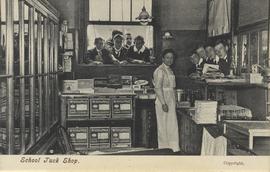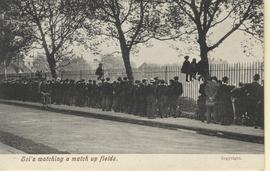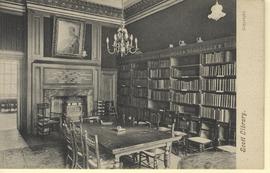Greatly enjoyed his time at King Edward VI Camp Hill Grammar School in Birmingham. Worked as a technician at the University of Birmingham for Neville Cartwright, a bacteriologist. Then worked in the Physics Department. Completed a PhD. [2:24] Started to consider teaching at a school. Enjoys the collegiate atmosphere and learning from colleagues about different subjects. [2:53] Started teaching at Sherbourne School in 1972 and stayed there for 19 years. [3:18] Head of Science at Westminster. Was attracted to the role’s combination of different sciences and the great reputation of the science department at the time. [4:51] The school is now a kinder place than it used to be, but hasn’t lost its academic edge or its tolerance for unusual people. Before, the school’s atmosphere could be quite abrasive and girls had to be survivors to enjoy it. [8:13] How to change the atmosphere in a school. [10:13] The characteristics of a Westminster pupil. Often more confident. Intellectual curiosity. [12:53] The importance of pupils progressing in every aspect of their lives. [15:10] Moved to SMT and gave up most teaching. Became the Senior Master and got to know more pupils. [18:30] He has really enjoyed his time in the SMT. Insight into the work behind the scenes. [19:58] Different Head Masters had little effect on him when he was Head of Science. They trusted him and left him to run the department. [22:33] Enormous increase in the number of pupils taking science. There is much more energy in the department than when he first came. [24:38] Changes in the science curriculum. Now more emphasis on understanding than in just knowing things. [26:48] Chemistry influences how he looks at the world. [28:42] His time as Chief Examiner for Edexcel.
Timestamp index:
Background. Grew up in Bromley and went to St Dunstan’s College. Enjoyed school. Teachers who made an impression. [2:10] Cambridge application process and the seventh term, to revise for the Oxbridge exam. [4:06] Teaching at a school in Beckenham between school and Cambridge. Assisting the owner of the school with his historical research. Life at Cambridge. [5:47] First posting was at Marlborough, his first experience of a boarding school. Always something to do. Changes at Marlborough over the 9 years he was there. [8:08] Being headhunted by Jim Cogan, Deputy Head, at Westminster. Long notice period requested, to prepare to change the Geography department at Westminster. [9.53] Problems with the Geography department’s teaching. Disappointing exam results. [11:06] Returning to London. [12:00] Perceptions of Geography by other Masters, and how this changed over the years. [13:13] Head of Department meetings. Much more combative than today. [15:24] Met Debbie, future wife, at Marlborough. She moved to London with him. [16:57] The founding of Purcell’s, the new girls’ boarding house. [19:42] Living at Purcell’s with Debbie, now Mistress in charge of girls at Westminster, and their children. [22:22] Changes to girls’ experience of Westminster over the years. Increasing focus on grades. [23:38] Parents becoming more involved. [25:13] Specific challenges with girls – discipline and pastoral. Often more easily upset. More focused. [27:50] The selection process. [29:00] His changing roles. [31:15] Head Masters’ different leadership styles. David Summerscale, Tristram Jones-Parry and Stephen Spurr. [33:51] Becoming Director of Studies. The importance of seeing people in their own classroom and space. [37:18] Quieter tone of Heads of Departments meetings today. Importance of autonomy for departments at Westminster. [40:20] Changes to school life. More societies, music and sport. [43:43] China project. Development of the project. Lessons learnt. Different working styles in China. [51:29] Decision to become the Head Master there. [53:02] Learning from previous Head Masters. Empowering those beneath you. [54:32] The privilege of living in London, at the heart of it all. Being close to theatres, cinemas, cricket.
One copy annotated on reverse as follows, by R.S. Chalk:
'Memories 1918-24 R.S.C
School- one of the three great losses in the Blitz.
Vastly impressive, tho’ by comparison with its present day counterpart, sombre, dusty and dark. (Yet HCW once lamented the Victorian ‘vandalism’ which enlarged all the medieval windows save one!)
Used for Assembly, lectures, Orations, Concerts, O.T.C. Parades (if wet), Physical Drill (‘Phys Hell’), Exams (as in this picture) and, above all, Latin Prayers.
Latin Prayers each day were a real joy- I never once heard criticism. All joined in singing in Elizabethan Latin. (I remember once (about 1920) three Arab Sheikhs attended these Prayers, and much impressed). The Masters knelt in the middle gangway on ‘pancake’ kneelers thrown (sic) out to them.
In the top foreground (then as now) may be seen the Pancake Bar. I was present in my second Term (Lent 1919) at the most famous Greaze of all- witnessed by King George V, Queen Mary, Prince of Wales and Prince Albert- won by D.L Moonan, K.S'
Depicts Burlington Arch in Little Dean's Yard.
One copy is annotated on reverse by R.S.C as follows:
'The focal point of Yard, which impressed me deeply when I first saw it (as a small boy in 1915). I wondered even then how boys could carve their names on it so expertly. (Later Mr. Green carved my name in College on wood for (I believe) the sum of 5/-).
The centre-piece of many a School compilation. (A tragedy the present ‘Eliza’ has no use for it).
In my day it was wrongly known by Town Boys in Under School as the ‘Up School Gateway’ (save the mark!). A new Junior KS. of my Election in his word-test called its designer ‘Jingo Jones’.
To the left is Sergeant’s Office (a ‘sanctum sanctorum’ where were compiled lists of those due for ‘Up School’ or Penal Drill), with the VI Form Room above it. To the right, in my day a convenient but ugly Fives Court, used (exclusively, I think) by K.SS. It was a vast improvement aesthetically when this was removed some years later and the vista opened into (hitherto unseen) College Gardens.'
One copy annotated on reverse by R.S. Chalk, as follows:
'Memories 1918-1924
The Scis (especially the smaller brand perched on the railings) were our most loyal supporters at both football and cricket matches. We were their “local side” and, in good and (more frequent) bad times alike their enthusiasm never faltered. Their cheering put ours to shame (except at House Matches, when there was a non-stop roar, Westminster cheering was tame). They knew all the 1st XI players by name. (“Bulldog” Keily - their nickname for him- was their special idol).
And we treated them abominably - thoughtlessly blocking their view by standing on the side nearest the railings (more shelter there) and affecting to ignore them or treat them with patronising disdain! (A ‘snob school’ indeed)
A quick-witted Cockneys, the Scis subjected ‘Scholars’ (as they called us) to a good deal of banter on the way up or down Fields - eg “Hey, Scholar! Lend me a dollar! Pay you back tomorrer!” K.SS they sometimes hailed as “Cup ‘n’ saucers” (ref. to College Cops)
To our shame be it said we took very little interest in the School Mission in Vincent Square, despite the noble services of (later Rev) R.E.C. Houghton. I (for one) only visited it once in all my six years.'
One copy annotated on reverse by R.S. Chalk, as follows:
'‘Lib’ was my far the most usual ‘occupat’ for boarders between School and prep. For one thing, most of us (I for one) were too jolly tired after the long day’s work to indulge in any more strenuous activity. That blissful hour of quiet from 5:15 till House bells rang for Tea at 6.10 remains a happy memory. Peace for a while!
Under the austere Librarian Rev. G.H. Nall and his elephantine assistant J.J. Huckwell, the rule of SILENCE was most rigidly observed. Some relaxations were introduced from 1922 under A.T. Willett, when board games such as Chess or even ‘Attack’ were provided.
On wet days, Lib was occasionally a welcome alternative to Station up fields.
We were proud of Lib, and used to boast it contained 10,000 books (!). Of these the most popular were “Dracula” (I never obtained it till my sixth year) and, among humorous works, Stephen Leacock.
The walls of Lib were covered by prints of noted OWW. I was sad (if not surprised) to find these replaced after the War by contemporary art'
